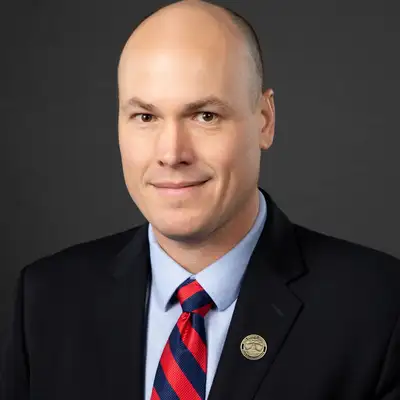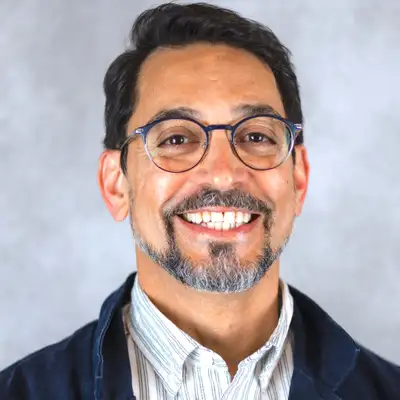Young Democrats Fighting for Rural America
Heidi Heitkamp [00:00:04]:
Hi, welcome to the Hot Dish Comfort Food for middle America. I'm Heidi Heitkamp.
Joel Heitkamp [00:00:09]:
And I'm Joel Heitkamp. There's a lot going on in the country right now. We have a lot to talk about, including Donald Trump's inauguration earlier this week.
Heidi Heitkamp [00:00:17]:
You know, it is kind of an amazing kind of turn of events. Come back, kid. I don't think you can argue anything. You know, this is a guy who, probably after the insurrection, everybody thought was done. Well, that didn't happen. So, you know, we're in for an interesting four years. So, Joel, I watched the whole thing, including the. I can't get the audio to work for poor Carrie Underwood, but what was your reaction to the inaugural speech?
Joel Heitkamp [00:00:47]:
Well, I thought it was an opportunity for something historic, the type of thing that people use later on for, you know, like JFK, like FDR, like one of those type speeches. And it wasn't. It actually was very. Well, it was incredibly negative.
Heidi Heitkamp [00:01:05]:
It was pretty pedestrian. Pretty pedestrian.
Joel Heitkamp [00:01:09]:
I wanted to grab him and say, you realize Joe Biden's right behind you, Right? Yeah. Unlike you, he came.
Heidi Heitkamp [00:01:17]:
I talked to someone completely nonpartisan, who said the whole while it made him so uncomfortable.
Joel Heitkamp [00:01:24]:
Yeah.
Heidi Heitkamp [00:01:24]:
You know, because people just don't do that in the Midwest, you know, like invite someone to a party and then spend their whole time criticizing him. But it. You know, the word that I would use for it is, it was small.
Heidi Heitkamp [00:01:37]:
Yeah. That's fair. Petty, vindictive. I mean, it really was. It was a chance for him to really. He spent the whole first half of his speech, which, as a talk radio host, I can tell you, the beginning matters. It defines it. People tune out.
Joel Heitkamp [00:01:54]:
You know, you can tease. You can tease, but he spent the whole first half describing how bad the Biden administration was. Here's the note. The Biden administration is done.
Heidi Heitkamp [00:02:05]:
Yeah. I mean, it's not only that, but they're handing you a pretty damn good economy. And then he went like, you know, there's nothing good in America, which, you know, maybe his listeners. What. What I thought was fascinating, though, Joel, is that he gave that speech where the whole while, I'm like, eyes wide open, waiting for that moment. There was a little bit of that at the end, but to your point, the end doesn't count. Right. Because you've already created an impression about the speech.
Heidi Heitkamp [00:02:32]:
And then he goes downstairs and says, this is the speech I really wanted to give, and it was even more negative.
Joel Heitkamp [00:02:39]:
Yeah. I'll ask you a question in regards to what you thought the people around him, you know, he. He surrounded himself with individuals that are going to jump up and holler and do whatever he wants them to do. I just thought it wasn't dignified, you know.
Heidi Heitkamp [00:03:00]:
Well, it was flat.
Joel Heitkamp [00:03:02]:
Well, it was more than flat. I mean, when you're sitting there with Elon Musk hooting and hollering like a class B basketball game, you know, that isn't a presidential inaugural. And one other criticism I have, I went ice fishing this last weekend. It was 20 below in North Dakota.
Heidi Heitkamp [00:03:20]:
Right. But you were out there.
Joel Heitkamp [00:03:22]:
I was out there, by God. And, you know, so it's 25 degrees, and he's too. Too big of a whip to go out. That was all about the crowd size in the mall. That's what that was about. He couldn't get people to it, so he didn't want people to see it.
Heidi Heitkamp [00:03:38]:
Well, and then, you know, the flip side of that is that I talked to a congressional wife this morning, Republican, who said they were scrambling for two days trying to figure out what they were going to do with the people who spent money from their district to come and watch and had no place to go.
Joel Heitkamp [00:03:56]:
Yeah, well, I hope they were hockey fans, you know, because when the Clintons came into the rotunda, you know, the. The whole hockey arena, where the fans, the people, she just describ or did nothing but boo. Again, not an inaugural. It's a new chapter, a new day in America. And so not a lot of sympathy for me. The one thing I will guarantee you, he won't return the money.
Heidi Heitkamp [00:04:25]:
Okay, so just a quick. I know this a little off topic, but this bitcoin thing, this bitcoin scam and the whole. While cryptocurrency is trying to convince everybody that, oh, this is really legitimate. This is, you know, this is the wave of the future. And then there's billions of dollars in a day coming to Trump because he launched a bitcoin. He's a grifter. I mean, my God. And we're back at it, and I just look at it and say, okay, I think that there should be.
Heidi Heitkamp [00:04:58]:
Don't say he has to return it, but there should be transparency on who's buying those coins.
Joel Heitkamp [00:05:03]:
Well, by last night already, he was selling inaugural watches. Did you see that? No, I'm serious. He was selling inaugural watches for the.
Heidi Heitkamp [00:05:11]:
Inaugural committee or for who?
Joel Heitkamp [00:05:13]:
Oh, I don't know. You know, for idiots. The idiots that bought him. I. It's. It's just who he is. The people knew who he was when they voted for him. You know, that rewriting of history.
Joel Heitkamp [00:05:25]:
36% of the youth vote more than what she got. I mean, it's, it's, it's whether or not you believe lies.
Heidi Heitkamp [00:05:32]:
Yeah, that's what we're going to have a lot of time to analyze this, but I want you to think about this for our next conversation, which is, you know, he is the right wing populist. Right. You know, the Joe, average Joe on the street. But who was there? The oligarchs of America. And so is this a turn to a business, you know, more business perspective, or is the Trump administration still going to be consistent with left wing populism? That's a real big question in my mind.
Joel Heitkamp [00:06:04]:
Well, but here, Heidi, here's what he doesn't have to worry about. Right. He pardoned right away a whole bunch of people that beat up law enforcement. One of those individuals was drugged from the Capitol onto the steps of the Capitol and pounded with an American flag. And Donald Trump pardoned the individuals that did that to him yesterday. And I'll guarantee you this, the police union today loves Donald Trump.
Heidi Heitkamp [00:06:30]:
Yeah.
Joel Heitkamp [00:06:31]:
So if we're asking, hey, you know, is this something that the, the populists are going to, you know, kind of realize is a shell game? Nope, nope, nope, nope.
Heidi Heitkamp [00:06:43]:
We're going to have tons to talk about, but an interesting day. You and I didn't have very divergent opinions about what happened yesterday, so. But all I could say is, poor Carrie Underwood. She managed it pretty well.
Joel Heitkamp [00:06:58]:
It isn't that for Carrie Underwood. She's going to sell less records and get.
Heidi Heitkamp [00:07:03]:
I don't know.
Joel Heitkamp [00:07:04]:
Oh, I do know.
Heidi Heitkamp [00:07:05]:
Anyway, let's talk about that later. So, Joel, you. I've been watching the confirmation hearings, and I have yet to see someone I don't think is going to get confirmed. I think the Republican Party is going to fall in line and, you know, basically the smart thing here, and I have to give props to John Th, because clearly this president elect wanted the Senate to do recessed appointments, and I think he pushed back pretty strongly. I think had they taken all this to recess appointments, they would have missed an opportunity to look like they were willing to stand up for the agenda. They dodged millions of questions. I mean, they weren't going to answer them. They were just going to punch and pivot.
Heidi Heitkamp [00:07:50]:
They were all well trained and pretty, pretty, pretty well prepped. And so, but, but I think the Democrats may have missed the mark a little bit by not heading to an agenda and looking forward there. Lots of, lots of discussion about character flaws, lots of discussion about past statements, whether it was misogynistic, and I get it, those were pretty horrible. But I'm not sure, given who the people voted to, who return to the presidency, that's a winning message going forward.
Joel Heitkamp [00:08:22]:
Well, the, the, the tell for me was Senator inside of Iowa, here's a woman that served this country in uniform. Here's a woman that openly discussed, you know, what, what happened to her sexually. And you know, when, when she decided and came out in favor of Pete Hath, then the gig was up. Then you knew that the Republicans were going to walk lock step with whatever Donald Trump wanted, whatever he wanted them to do. And of course, all he had to do was threaten the primary. And it worked in Iowa. There's no question about that.
Heidi Heitkamp [00:08:57]:
Yeah. And, and the other shot across the bow from the Trump administration to Congress was the removal of Congressman Rogers from the House Intel Committee. Rogers has been, you know, openly clear that Russia is trying to basically interfere with our elections. He has basically been straight up telling you what the intel that he looks at is looking at. And that's not a popular message with the President elect and now sworn in president. So, Joel, you know, I think Mike Johnson, payback as hell. And he got his job because of Trump and Trump's now doing his job, near as I can tell.
Joel Heitkamp [00:09:38]:
Well, to the winner go the spoils. And clearly that's happening for Donald Trump. He won and he's getting what he wants in the end. These nominees are going to be judged by what they do. You know, they're going to be judged by how they do their job. They're going to be watched, they're going to be, you know, I think Hagseth is going to be one of the perfect examples. Your former colleague Rubio is going to be, you know, he's qualified, you know what he's going to do. I mean, the man, I'd vote for him, no question.
Joel Heitkamp [00:10:06]:
Hegseth, I would. And so we'll find out whether or not I was wrong. But I would add this, that when it comes to Donald Trump, in the end, what's going to end up happening, Heidi, that determines this second Grover Cleveland administration is going to be whether or not the economy works and if the tariffs work, if this one country project focuses on the middle of this country, it focuses rural. And I don't see tariffs helping us. If they do, then by God, I'm wrong and Donald Trump will be deemed a success. If they don't, I think you'll find excuses being given out on why they don't. But the truth is maybe the middle of this country kind of gets a feel for what's happening.
Heidi Heitkamp [00:10:54]:
Well, I mean, so how long, I mean, that's the question. How long can we expect before our coffee prices go down and our eggs prices go down? I mean, when's all that gonna happen? When are we gonna see lower insurance rates for homeowners? Don't think that's gonna happen anytime soon. After the California fires and the increased claims. And let's just admit it, because of whether you wanna say weather patterns, extreme weather, or whether you wanna say climate change, we are experiencing more and more of the cost of extreme weather, and that's being borne by the insurance industry. And so, you know, these are, these are benchmarks that the Democratic Party should be laying down right now and basically saying, okay, when can we expect these problems to be solved?
Joel Heitkamp [00:11:41]:
Well, and that's part of the questioning that should have happened during the confirmations. I'm sorry, but, you know, focusing on a man's infidelity isn't going to get you very far because there's a lot of people in this country that misbehave. So we might disagree on that, but for me personally, in the end, I would have called out and asked these individuals exactly how they were going to accomplish what Donald Trump promised. Heidi.
Heidi Heitkamp [00:12:09]:
Yeah, well, you know, the thing is, it was, was really about oath. When somebody comes in and says, my word is my bond. Well, you know, you kind of, kind of open up yourself for that line of questioning. But at the end of the day, if the, the American public found it disqualifying to cheat on your wife, they just elected a guy who clearly cheated on his wife many, many times. And I was adjudicated to have done so. So I don't think that for the majority of Americans who vote in this country, that was disqualifying.
Joel Heitkamp [00:12:41]:
No, and that's my point. I mean, I think they almost expect it out of this administration. And you don't qualify for one of these positions unless you do. Yeah, it's obviously a joke, but, you know, I just would have focused far more on the number of people in the military. You know, I would have made the lead story on managing that big of a staff, that many personnel. And as somebody who's managed people on a much smaller scale, way smaller scale, I can tell you this. Being the boss isn't easy. And being the boss of millions is going to be pretty tough.
Heidi Heitkamp [00:13:23]:
Well, and here's, here's another benchmark. He's basically said now that Donald Trump is in charge of, of the military and he's going to be in charge. Recruitment will go through the roof. Well, let's see.
Joel Heitkamp [00:13:35]:
Yeah.
Heidi Heitkamp [00:13:36]:
See if that's true.
Joel Heitkamp [00:13:37]:
Well, a great point. You know, but the upside for me is the Ukrainian war is over and my eggs are cheaper.
Heidi Heitkamp [00:13:45]:
And again, and we all are unified in advancing the bro culture, which is what this is all about. Yeah.
Joel Heitkamp [00:13:56]:
Well.
Heidi Heitkamp [00:13:56]:
Well, listen, Joel, we going to have a lot to talk about. You know, a farm bill that's still not around, commodity prices, which are really struggling. You know, kind of waiting interest in doing anything in the biofuels area, especially aviation fuels and what that means. What's going to happen with the ira, the Inflation Reduction act, which they've promised to repeal, what this means for student loan debt. I mean, there's going to be a lot of people who have expectations and deportations, who have expectations of what's going to happen. And things are going to change that.
Heidi Heitkamp [00:14:35]:
That.
Heidi Heitkamp [00:14:35]:
That's one thing for sure. And so we'll see if people like the change.
Joel Heitkamp [00:14:39]:
Yep. And we'll find out whether the media does its job or whether people just believe what they read on Facebook. That's going to be the key.
Heidi Heitkamp [00:14:46]:
Yeah, people.
Heidi Heitkamp [00:14:47]:
I mean, you know, the one thing the Democrats need to be better at is figuring out how to get your message out. I mean, when, when, you know, the meta guy, Zuckerberg says we're going to crowdsource fact checking, then we better be the crowd that's helping. Fact check.
Joel Heitkamp [00:15:04]:
Well, I do go to my Facebook page, go to my ex account.
Heidi Heitkamp [00:15:09]:
You'll see they really love you. They love you there.
Joel Heitkamp [00:15:12]:
Some do, some don't. You know what's sad is that most of the people that don't like me seem to be relatives. No, I'm kidding.
Heidi Heitkamp [00:15:21]:
You know, Joel, we keep focusing here at One country in the Hot Dish on what's happening in rural America. And I had an opportunity to speak with Sarah Godlewski, our board member, a wonderful, wonderful public official. She's Wisconsin Secretary of State. And we talked a lot about the Democratic Party and the opportunities that were missed maybe in the last four years to actually communicate better with people in rural America. And Wisconsin is kind of ground zero. Wisconsin and Iowa, two states that I think still everybody thinks I was lost forever. I'm not convinced about that. But I definitely think that we can't develop a unified American message if we aren't figuring out how to talk to rural America.
Joel Heitkamp [00:16:04]:
Man, Sarah is something else. Know who else is great? Anderson Clayton. She's the chair of the North Carolina Democratic Party, the youngest in the country at 25 years old. She and One country board member JD Scholten are their pals. They're buddies and they recently had a conversation about young folks in rural and small town America. You know what? I think you're gonna like this.
J.D. Scholten [00:16:33]:
Hello listeners. I'm JD Scholten, a One Country Project board member. And today I'm speaking with my friend Anderson Clayton. She is the chair of the North Carolina Democratic Party and she was elected in 2023 at the age of 25. She is the youngest chair of the state political parties in the U.S. so welcome to the Hot Dish, Anderson.
Anderson Clayton [00:16:54]:
Happy to be here, J.D. thanks for having me.
J.D. Scholten [00:16:56]:
I think for the listeners, I want to get them up to speed on our relationship. So bring it back to 2020. I'm running for, or I guess 2019. The 2020 caucus is in Iowa and I, I got a message from organizers saying, hey, can we talk? I believe that's how it started. I don't know. But do you want to talk about how we've initially got connected?
Anderson Clayton [00:17:22]:
Honestly, I think I started off as just a fan of JD Scholten and the campaign that you ran for Congress originally and then also now in the state legislature. I think that the way that you talk about rural policy and whether you met like just met people where they were on the campaign trail in Iowa, you were always somebody that I think that a lot of I should backtrack, I guess. You know, when you're a rural organizer, there's only but so many of us. And so it is very easy to find the other people throughout the country that are engaging in rural organizing that are talking about these issues. And I think that I discovered you first through Twitter, which is now X unfortunately in that sense too. But I think that's where that relationship first really began. And then I was in the caucuses in 2019, obviously as an organizer, and I just got to see how much you put into the ground game. And so I think I started off as a fan and now I get to sort of be a colleague, which is cool in every capacity for me at this moment in time.
J.D. Scholten [00:18:16]:
Well, now the fan is switched and I'm a huge fan of what you've been doing. So can you talk a little bit about what made you want to like become the chair of North Carolina Dems and kind of what you saw in the 2024 or just kind of, I guess before you we talk about what you saw in the 2024 election, just what made you want to run for it and kind of the first parts of, of what it means to be a chair in North Carolina.
Anderson Clayton [00:18:40]:
I ran for state party chair I think in an unconventional way and it has been the wildest ride of my life for the last two years and one of the best. And I think that we came in really building and infrastructure, trying to build a grassroots infrastructure in North Carolina. And I ran a campaign for state party chair around listening to the grassroots, bringing in the, the bottom voices that never really get to have a say in what happens in politics which are our county party chairs, our precinct chairs, our volunteers, and building up a year round organizing program that really emphasizes local elections and municipal elections. And so when I got elected in 2023, North Carolina Dems were able to have big wins across the state that included flipping whole city councils and also mayor's offices in not just urban communities but also rural North Carolina. And it became a place where we were able to see, you know, when you build from the bottom up, you always have a better response and a better reaction from your, your people in their communities that have been affected by policy at the local level which we all know impacts them the Most. And so 24 was a wilder ride I would say. But North Carolina was able to prevail against some pretty strong Republican headwinds at the national level. And I think that came from good candidate quality.
Anderson Clayton [00:19:53]:
We were one of the only states in the country besides I think Florida and I think Iowa actually was one of the other states that recruited or maybe it was Idaho if I'm not mistaken. One of the eyes in the Midwest, I promise. And in the west were able to recruit all of their state legislative seats. And so North Carolina was able to contest all but two. And that really helped us prevail in breaking a Republican super majority and winning a Democratic governor's seat, a lieutenant governor's seat, and also we're fighting out right now a Supreme Court justice race that is the last race that has not been called in the entire country that has not been given a certificate of election yet in the state.
J.D. Scholten [00:20:29]:
First of all, offended because it's not Iowa. That's all right. Second, do you want to talk about that race a little bit? Because I think that's on a lot of people's minds right now.
Anderson Clayton [00:20:39]:
I think it should be. You know, we are genuinely looking at Republicans are trying to steal an election in our state. And it's the, when you say it out loud, it kind of sounds crazy and you can't really believe we're in that universe, but we should be able to believe that we're in this universe because of what happened with Donald Trump in 2020. And really where this originated from, it starts with his election in 2020. And it starts with the folks like Cleta Mitchell at the national level building up an apparatus from Republican election deniers that wanted to figure out ways to challenge election results across this country. And they built the Election Integrity Network that ended up having a chapter in North Carolina that when they were trying to come up with, how do we, you know, establish and how do we look at challenging election results? You know, what are some of the ways that we can do that in. And it's resulted in the four lawsuits that currently sit in both state and federal court right now. Judge Jefferson Griffin is a Republican Court of appeals judge in the state, and he lost an election to Democratic Supreme Court Justice Alison Riggs to hold that Supreme Court justice seat by 734 votes.
Anderson Clayton [00:21:43]:
And right now, folks are looking at every level to try to challenge over 60,000 voters in the state of North Carolina who did everything right when they went in to vote, including showing a photo ID and making sure that they had registered correctly beforehand by the state board of elections and what they had deemed necessary. And Republicans are trying to take away this election. And Jefferson Griffin just launched another lawsuit this, this week that said, okay, maybe we don't need to challenge all 60,000. Maybe we'll only just challenge overseas voters and military voters right now in the state. But just make it so that I can win however many voters I can challenge that I can win this election. And we're seeing it play out in our state right now.
J.D. Scholten [00:22:24]:
That's awful. Let's transition into something more hopeful. So 2024 was not the greatest year for politics. So I guess we'll ease into the hopefulness. What did you learn as a state chair and just overall about just with the elections in 2024?
Anderson Clayton [00:22:38]:
I think I learned that candidate quality is one of the most important things that we don't necessarily consider all the time, especially when it comes for every race on the ballot. Because what we saw in North Carolina and what I just described, that Supreme Court race is down to 734 votes. And that meant that field margins mattered. And I think a lot of what I'm hearing post analysis of this election is that Democrats need to run away from their values. Democrats need to run away with, from traditional ways of organizing. And I'm not saying we don't need to embrace new ones. I just think that, you know, there is still a Respect level to meeting somebody at their doorstep and bringing politics to them. And I think that so many people right now are trying to challenge that and they're trying to make it so that we only need to be creating new media apparatuses, which I don't disagree with.
Anderson Clayton [00:23:23]:
But I think that what we know from rural organizing is that you can walk and chew gum at the same time and most of the time you have to. And I don't think that we have to negate one for the other. But I also learned that Democrats, our message and our branding and our party right. Is something that it's not just rural North Carolina right now, that and rural America that is not buying into it. And I think that we have got to get better off at selling a vision of what it looks like to be a strong party in this country and, and also what it means to represent those values. But I hope North Carolina shows people that running away from the Democratic values is not the way we do that. And I, I think that, you know, it shows at the state level where we won some six statewide races in North Carolina, we had 15 statewide races on the ballot this year, including the presidential, which is something else not a lot of people know about. Our state is just how many of those court of appeals races, Supreme Court races, and all those congressional races and everything else can add up down ballot too.
Anderson Clayton [00:24:18]:
It's just, I think that we have a lot of opportunities to show people what our party looks like at every level and we need to embrace that. And North Carolina, I think did that in a way this year where we had phenomenal people like Mo Green step up to run for superintendent and know Justice. Allison Riggs is a voting rights attorney and someone that came up through the Southern Coalition of Social justice for her career path in politics and in law. And I think that someone like that running for office, it matters the type of people that we have.
J.D. Scholten [00:24:43]:
I, I love what you had to say about not running away from our values because that's it's especially. I ran for Congress in a very conservative area and people would say, oh, if you were more this or you're more that. I'm like at the end of the day, I ran as who was I am and win or lose like that. I, I'm, I'm comfortable with my race because I did that. And so I appreciate your words on that. One of the struggles I think in the Democratic Party is I guess when I was young, when I was your age, there was like it was cool to be a Democrat. Like we had Obama, like, it was fresh and everything. And I feel like we're, we're, we're not the cool kids.
J.D. Scholten [00:25:19]:
I'm not saying Republicans are all that by any means, but what do you think that the Democrats need to do to just get back that, that swag? I guess, for lack of a better.
Anderson Clayton [00:25:29]:
Term, I think that we need to embrace more people than just like the typical messengers of our party, which. That is something we have so many Democrats at the local level in North Carolina that are just phenomenal. And we're going to try this year to make sure that we uplift those voices on the ground. People like Whaling White, who is one of our rural out there in Hertford county and a husky that North Carolina, the mayor, he's 32, a young black man who has come up like he's from rural North Carolina, went back there. And I just think, like, those stories telling more of, like, how good Democrats are doing good work in their communities is something that we embrace more. Because I don't necessarily know it's about swagger. I think it's about, like, whether or not, and I like your messaging on that, J.D. i get it, but I'm like, I think it's about just whether or not people feel like Democrats care about them and, and whether or not our party cares about people overall in this country.
Anderson Clayton [00:26:21]:
And that's something where I just don't feel like we can run from that anymore either.
J.D. Scholten [00:26:25]:
Yeah, I think you said it way better than what I did. I mean, at the end of the day, I don't care to be cool. I want to win elections and I want to get past things here at the, I'm currently at the I.O. capitol, and I want to pass things that help my constituents in Iowans. At the end of the day, rather than trying to be cool or anything, you're, you're, that's why you're a better messenger than I am. Anderson. What, What? I guess before we get into the hope, which we'll end with. But, like, what is something that you're worried about? Obviously, election denial is probably one of those.
J.D. Scholten [00:26:52]:
But what are other things that, that kind of is worrisome that you see as a chair of a state party?
Anderson Clayton [00:26:58]:
I mean, if Republicans are able to steal this election in North Carolina right now, it opens it up for them to do whatever they want to across the country. And I think that what we're looking at in North Carolina is a, a pilot program for them right now to figure out if we can challenge 60,000 votes here. We can challenge 200,000 in Pennsylvania. We can do it in Wisconsin. We can do it everywhere else too. Because a lot of what they're challenging are voters that were Pre registered before 2002, before the help Americans Vote act was passed. And what happened in 2002 with that legislation was that it required you to have your driver's license number or your Social Security number attached to your voter registration form. And if there were folks that registered before that, they were grandfathered in.
Anderson Clayton [00:27:40]:
And so they have done nothing wrong in this process. But Jefferson Griffin is still coming after them. And I think that is the, the subversion of democracy that I am worried about and that I'm nervous about and trying to make the, the urgency around that honestly palpable for people because I think that I have sat for the last two months realizing that this could be possible. And we, we are deeply worried about what's going to happen in our state and also for this country after that and what it depends on. And I know that's not necessarily hopeful, it might be what you want to go into next. But I think the hope part that I have of that is looking at the fact that we're fighting back and like, like they're going to have to cry this election from my cold dead hands, to be honest with you. And that's where I'm like, they can bury me in court fees, they can try to bury us in the fact that we're talking about special elections in North Carolina. We're talking about like, what is the worst possible case scenario that could happen right now.
Anderson Clayton [00:28:31]:
And Democrats are getting prepared for whatever we need to do to put up the resistance, the fight. And I think that that's what we're seeing nationally too is we want a strong party and we want people to, to fight back. And that's what I think Americans need to see from us right now too.
J.D. Scholten [00:28:45]:
We have a DNC chair election coming. What do you want to see from a chair at the DNC level?
Anderson Clayton [00:28:52]:
I'm going to disclose it right now though. I've already endorsed Ben Wickler in this election for the DNC chair race because I think that he has done truly a phenomenal job of resourcing the state party infrastructure, which I think has been one of the least resourced and least utilized units of power building in our party right now. A lot of times we are looking at candid campaigns to build en masse and I'm like, no, we need a year round infrastructure that can do that where candidates feed into it. And we are all working as a team and a unit. And I really see that in his vision. But I also think that anybody that wins this election needs to be committed to resourcing state parties, paying state party chairs full time, because young people and working people don't end up in these positions otherwise. And it was a fight for me to get here and to do this. And I think that after the election results in North Carolina this year, people should want more young people and more, and not just young people, but folks that have been in the work, that have been organizers, that have been practitioners and not just politicians.
Anderson Clayton [00:29:48]:
Right. Leading our party right now. And I think that when you bring that energy into it, we're going to be, and we're going to see a new type of party.
J.D. Scholten [00:29:56]:
For listeners, I'll say that Heidi, Heidi Camp has endorsed Ken Martin. But at the end of the day, we're all Democrats. We're all going to support whoever's at the top. So I'll just mention that. But so, okay, let's, let's move on to hope. I know the next four years with the president is not going to be the greatest, but what gives you hope right now?
Anderson Clayton [00:30:13]:
The ability to be able to fight. Like, like I said earlier, I think that Democrats have so much left to prove about being a party of service. And Democrats have a lot of policies that are still going to be enacted over the next two and four years and six years from Joe Biden's administration that we have to continuously be talking about and telling folks where that came from. Folks have got short memories. And that is why I think, an aggressive strategy of making sure that we do have a communications platform that enables us to be able to get a message out to our own party, our own base of people, so that they can be spreading the message in their communities about what we're doing organically and creating an organizing program that backs that up with helping and reaching out to people in communities about what services do we provide. You know, western North Carolina right now is still suffering from Hurricane Helene damage in major ways. And, you know, we just were seeing videos of folks when we had huge snow come through, huge for the mountains of North Carolina, at least in that sense, maybe not for the Midwest where you are right now. JD but we had snow come through and a snowstorm and folks were lacking propane to heat their homes with.
Anderson Clayton [00:31:14]:
And, you know, making sure that the Democratic Party is there and enabling resources to flow. And if that means that we know we need to have our state legislators and anybody from other parts of the state out there to amplifying those messages. That's what we've got to do and we're going to be able to this year and I'm excited about that.
J.D. Scholten [00:31:29]:
Well, Anderson, you give me so much hope. It's been so fun to see you progress from an organizer here during the caucuses to now leading North Carolina Democrats. And I'm just so proud of you and just excited of what you're able to do because I do feel that the party does need a changing of the guard, so to speak. We need younger folks like yourself and young leaders and, and that that's what gives me hope. Thank you for all that you do. And I just, just excited to see what North Carolina does next.
Anderson Clayton [00:32:00]:
Thank you. I'm such a huge fan of your still JD So thank you for all that you're doing for Iowans and for folks out there everywhere. And if you can help us out with any sort of donation to our judicial fund, though, right now, like I said, we're in a legal fight of our lives out here in the south and Republicans are trying to steal an election. You can go to ncdp.org backslash donate. We would appreciate it.
J.D. Scholten [00:32:19]:
I didn't catch that. What was that again? What was the website?
Anderson Clayton [00:32:21]:
It is ncdp.org donate and anyone can either honestly to sign up to volunteer help us out. We've got municipal elections this year and North Carolina Dems are going to be playing hard in every quarter of North Carolina.
J.D. Scholten [00:32:35]:
Wonderful. Thank you so much, Anderson.
Kristen Soltis Anderson [00:32:36]:
Thank you. You know, when you hear someone young like this talk the way she talks and doing the things she's doing, you just have a lot more hope for more bipartisan kind of country and an opportunity for young people to get engaged. So thank you listeners for joining us. I hope you had as much fun and enjoyed the interesting conversations. We sure did.
Joel Heitkamp [00:33:01]:
You bet. Tell us what you think. Email us your thoughts, questions and suggestions. Our address is Podcast country Project. That's podcastonecountryproject.org and the hot dishes brought.
Heidi Heitkamp [00:33:17]:
To you by the One Country Project. Learn more about the One Country Project at one countryproject.org we'll be back in two weeks with more hot dish comfort food for Middle America.
Creators and Guests








